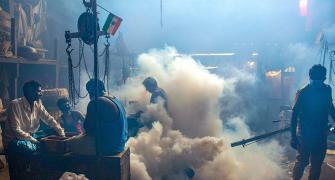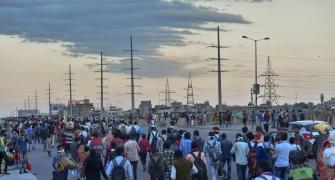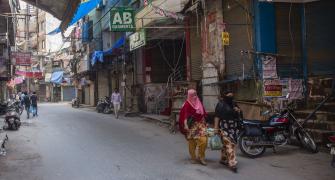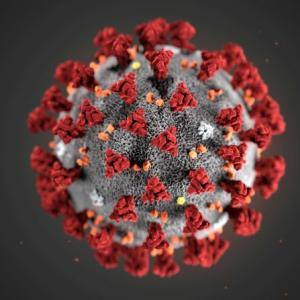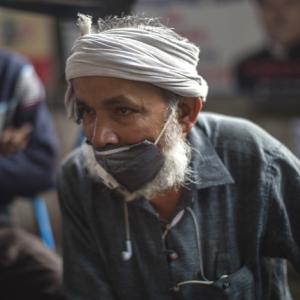'There is little doubt that China today stands in the dock, charged with misdemeanour with regard to the health and well-being of its own citizens and of the people of the world,' notes Amulya Ganguli.
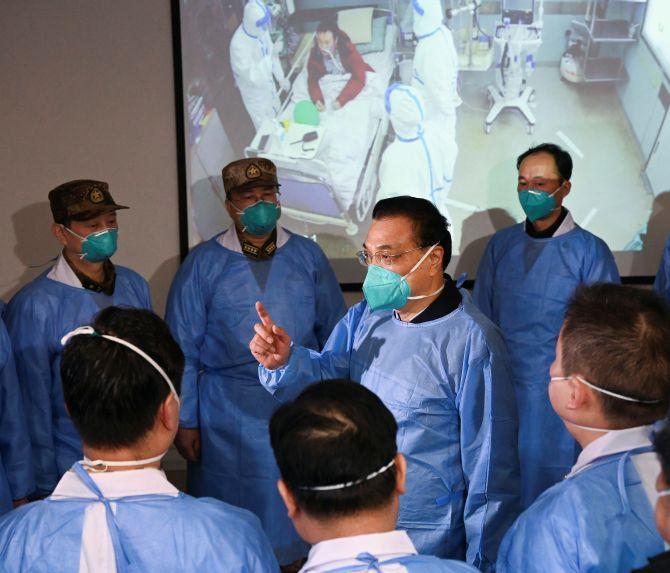
After Deng Xiaoping launched his four modernisations drive in the late 1970s related to agriculture, industry, defence and science and technology to extricate China from Mao Zedong's personalised ideological straitjacket, a pro-democracy activist, Wei Jingsheng, put up a poster on the so-called 'democracy wall' in Beijing, calling for the democratisation of China.
He called it the 'fifth modernisation'.
According to him, 'the only form of modernisation worth having should bring democracy and freedom'.
Wei was arrested and spent 18 years in jail before being deported to the US.
Today, as the world reels under the devastating impact of the coronavirus -- or the Kung Flu, as the ailment has been sarcastically dubbed by netizens -- the veracity of Wei's advice has become crystal clear, as it always had been.
If only China had known democracy and freedom, and not been under the jackboots of a dictatorship, it could have saved itself -- and the world -- from the scourge of what United States President Donald J Trump has called the Chinese virus.
The reason why democracy would have been a saviour is that the kind of a cover-up to which the Chinese authorities resorted in the early days of the outbreak would not have been possible in an open society.
As has been suggested by, among others, Chang-Dae Hyun of the University of Toronto, the 'great leap famine', as he has said, would not have taken place if there was democracy in China at the time.
The presence of a free press would have made Mao pay greater attention to the reports of starvation deaths in the countryside.
It is for this reason that Nobel Laureate Amartya Sen has said that 'famines have not actually occurred in functioning democracies' because 'if the government is vulnerable to public opinion, then famines are a dreadfully bad thing to have.'
'You can't win many elections after a famine and you don't like being criticised by newspapers, Opposition parties in parliament, and so on. Democracy gives the government an immediate political incentive to act.'
There was no such incentive for the Chinese in Wuhan last December when the first patient became ill with COVID-19.
As a timeline available on Google shows, hospitals in Wuhan, then the epicentre, noticed an exponential rise in coronavirus cases within three weeks of the first infection in early December.
But not only was the world as well as the Chinese themselves kept in darkness about the new disease by the Chinese government, the doctor, Li Wenliang, who had issued an warning -- the whistleblower, as he is now called -- was forced to withdraw his statements.
All this is typical of Communist rulers who believe that any disclosures about their failures will undermine the supposedly infallible Communist party's authority.
The rest is history.
But while the role of the Communists is predictable and understandable -- Indian comrades refused to acknowledge for years that Nikita Khrushchev ever made his de-Stalinisation speech in 1956 since it dethroned their revered idol -- what is not easy to comprehend is the delay in the World Health Organisation' awareness of the threat unfolding in China.
The WHO director-general is now holding press conferences to inform the world about the rising menace, but had his organization been more active last December and January about what was happening in Wuhan and not relied blindly on what the Chinese were saying, the world would have been spared much of its present agony and so many lives would not have been needlessly lost.
To be fair, the rightists, too, can live in denial as their refusal to believe in global warning or Trump's insistence on Americans returning to normal life by Easter show.
Brazil's President Jair Bolsonaro has also been downplaying the threat from coronavirus.
'I am sorry, some people will die... that's life,' Bolsonaro said, adding that 'you can't stop a car factory because of traffic deaths'.
If Bolsonaro has turned philosophical, another far right politician, Hungary's Viktor Orban, has seen in the outbreak an opportunity to strengthen his grip on the country by asking parliament to approve of an emergency bill allowing the prime minister to rule by decree.
As the British magazine, The Economist, has noted, while the right-wingers will want the government to expand their ambit at a time of crisis like the present one, it has to be remembered that it is not easy to roll back such a measure.
But, as for the Chinese, their earlier attempts to mislead have now engendered doubts about the death toll in their country as thousands of urns await collection in Wuhan and the use of mobile phones and landlines has decreased in China by 21 miilion and 840,000 people respectively.
To compound matters, India has now joined the US to remind the world about the treaty signed by 183 countries banning the development, production and stockpiling of biological weapons.
There is little doubt that China today stands in the dock, charged with misdemeanour with regard to the health and well-being of its own citizens and of the people of the world.
Misdemeanour was the very word which was used by the Chinese authorities to criticise Li Wenliang for telling the truth.
Amulya Ganguli is a writer on current affairs.

